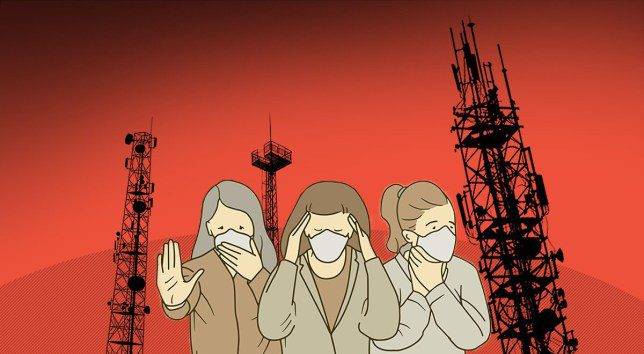Covid Conspiracy Hoax Reignited As Fresh 5G Mast Attacks Mar South Africa

Nine months have passed since conspiracy theory trumpeters first peddled a major falsehood that led to the destruction of up to 77 mobile towers in the United Kingdom (U.K.).
For a while, it seemed the world had managed to move on from an absurd conspiracy theory that was one of the many insanities that embody the insane year that was 2020. But some recent events in South Africa have proven that conspiracy nuts can always be trusted to be one thing: daft.
Just a few days ago, a South African district councillor, Sifiso Mngadi, pretty much declared that covid-19 is a hoax and fifth-generation (5G) technology is making people fall ill. He blamed the new 5G network for the current lethal second wave of Covid-19 infections and called for the immediate removal of 5G towers.
“This thing of watching [Health Minister] Zweli Mkhize and Ramaphosa… We need to disconnect the 5G. They have disconnected them in other countries, they destroyed them. We need to send a team from disaster management, electricity and IT. They know them. We can give them 24 hours to disconnect and leave behind the 4G and 3G. Otherwise, we will die,” said Mngadi, in a voice note that circulated around social media this week.
Not long after, three 5G cellphone towers belonging to Vodacom and MTN were burnt and destroyed.
South Africa happens to be one of the hardest-hit countries in Africa with over 1.1 million covid-19 cases and more than 31,000 deaths recorded so far. The so-called “second wave of Covid-19” has caused these figures to spike recently.
At the moment, the arsonists are still at large, having been obviously emboldened to perpetuate their destructive acts by the false claims of ward councillor, Mngadi, that “5G towers may be transmitting electromagnetic waves that may be responsible for the current exponential rise in the “so-called Covid-19 related deaths.”
For the avoidance of doubt, claims that 5G has something to do with coronavirus infections is completely false and such claims have, after several intensive studies, been debunked time and again by reputable institutions like the World Health Organisation (WHO) and the International Commission on Non-Ionizing Radiation Protection, which has deemed 5G to be safe.
5G is the fifth generation of cellular technology. It not only increases the speed at which data is transferred but also decreases latency and lag. It can, in theory, deliver data rates that are up to 100 times faster than 4G networks. 5G has the capacity to bring fibre-like speeds to areas that lack established physical infrastructure for fibre connections
Speeds can go into the realm of gigabits per second (Gbps), which is far greater than the megabits per second (Mbps) speeds that are seen on 4G and even on most fibre connections.
5G can enable a smarter and more convenient way of living, working and playing which cannot be supported by 3G and 4G networks. This includes smart homes and cities, cloud gaming and virtual reality, and the transformation of industries such as education, health care and manufacturing. It is also clear that there is no real harm to humans in establishing a 5G network.
The whole “5G brings Covid” harebrained nonsense possibly came about because both elements are new, so some conspiracy nuts have assumed they must be connected.
Spreading even faster than the virus itself and the speedy 5G connection, the conspiracy theories were especially rife in the months following the Covid-19 outbreak in Wuhan, China, which happens to be one of the first cities in the world to have a network of 5G towers. And more than half of the world’s fibre-optic cables are made in Wuhan.
Even now, several bogus theories continue to spread across the globe about Covid-19 being a smokescreen for the establishment of some kind of new world order that would enslave mankind to a group of overlords.
Besides that, conspiracy bums are currently fighting the covid-19 vaccine and calling it some kind of poison and 5G is still being called a killer.
As a matter of fact, in the U.K., mobile operators are stepping up efforts to roll out 5G networks, but they are facing resistance from local groups convinced that the new technology poses a threat to health.
“For instance, in the city of Bath, in Somerset, one such group is celebrating a victory after the local council refused permission for a 5G mast – with the backing of the local MP,” reports the BBC. Such is the madness in today’s world.
In May 2020, Vodacom switched on Africa’s first live 5G mobile network in South Africa and another South African telco, MTN, eventually followed suit in Mzansi before going on to unveil the technology in its biggest market, Nigeria, in November.
Following the attacks in South Africa, South Africa’s Minister of Communications and Digital Technologies, Stella Ndabeni-Abrahams, spoke of the destruction of the towers in a statement released on Thursday, January 7.
“The country currently needs resilient and high-speed connectivity for every citizen to enable them to participate meaningfully in the digital economy,” said Ndabeni-Abrahams. “It is regrettable that the much-needed network infrastructure is being destroyed.”
Also, South Africa’s leading political party, the African National Congress (ANC), has distanced itself from the misguided utterances of the ward councillor who is a member of the party. The party condemned the statement by Mngadi as party spokesperson Nhlakanipho Ntombela, said, “It is lunacy of the highest order, and you can quote me on that.”
Featured Image Courtesy: Metro